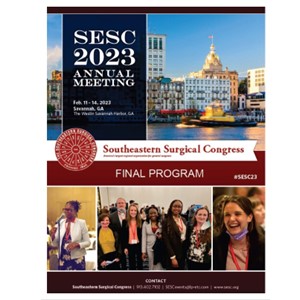Trauma
Category: Resident Forum
Quickshot Oral : Resident Forum
RF 10 - PREDICTIVE HEMORRHAGIC DEATH WITH INCREASING INJURY SEVERITY HIGHEST AMONG MOTORCYCLE COLLISIONS
Saturday, February 11, 2023
11:05am - 11:20am East Coast USA Time
- RO
Robert Olson, MD
Anesthesiology Resident
Grand Strand Medical Center, United States - HR
Heather Rhodes, Rhodes, PhD
Trauma Research Specialist
Grand Strand Medical Center, United States
Presenter(s)
Principal Contact(s)
Objectives: The leading cause of preventable traumatic death is uncontrolled bleeding. This study aimed to better identify those most likely to experience in-hospital mortality with increasing injury severity scoring (ISS).
Methods: This is a single-center study of Trauma Registry data, from July 3, 2016, to February 24, 2022. The inclusion criteria were based upon age (≥18 years) and in-hospital mortality. A linear regression was performed to ascertain the effects of predictor variables on the likelihood that an expired adult trauma patient will experience increasing ISS.
Results: 546 patients (mean age 58) were included in the analysis based on the methods section's requirements. A significant linear regression equation was found (F(33,295)=4.11, p<.01), with an R2 of 0.23. The most notable significant impact on increasing ISS included shock index ratio (β=5.95, p<.01, Mean=.74), activation of massive transfusion protocol (β=8.21, p<.01), GSW (β=6.37, p=.01), MCC (β=8.62, p<.01), and MVC (β=4.82, p=.01).
Conclusion: There were several significant associations with increasing ISS among those who experienced in-hospital mortality, which included a rising shock index ratio, activation of the massive transfusion protocol, and, most notably, MCC trauma. This research reiterates the importance of the "Stop the Bleed" campaign as vital for training laypersons in the life-saving technique for hemorrhage control.
Methods: This is a single-center study of Trauma Registry data, from July 3, 2016, to February 24, 2022. The inclusion criteria were based upon age (≥18 years) and in-hospital mortality. A linear regression was performed to ascertain the effects of predictor variables on the likelihood that an expired adult trauma patient will experience increasing ISS.
Results: 546 patients (mean age 58) were included in the analysis based on the methods section's requirements. A significant linear regression equation was found (F(33,295)=4.11, p<.01), with an R2 of 0.23. The most notable significant impact on increasing ISS included shock index ratio (β=5.95, p<.01, Mean=.74), activation of massive transfusion protocol (β=8.21, p<.01), GSW (β=6.37, p=.01), MCC (β=8.62, p<.01), and MVC (β=4.82, p=.01).
Conclusion: There were several significant associations with increasing ISS among those who experienced in-hospital mortality, which included a rising shock index ratio, activation of the massive transfusion protocol, and, most notably, MCC trauma. This research reiterates the importance of the "Stop the Bleed" campaign as vital for training laypersons in the life-saving technique for hemorrhage control.

